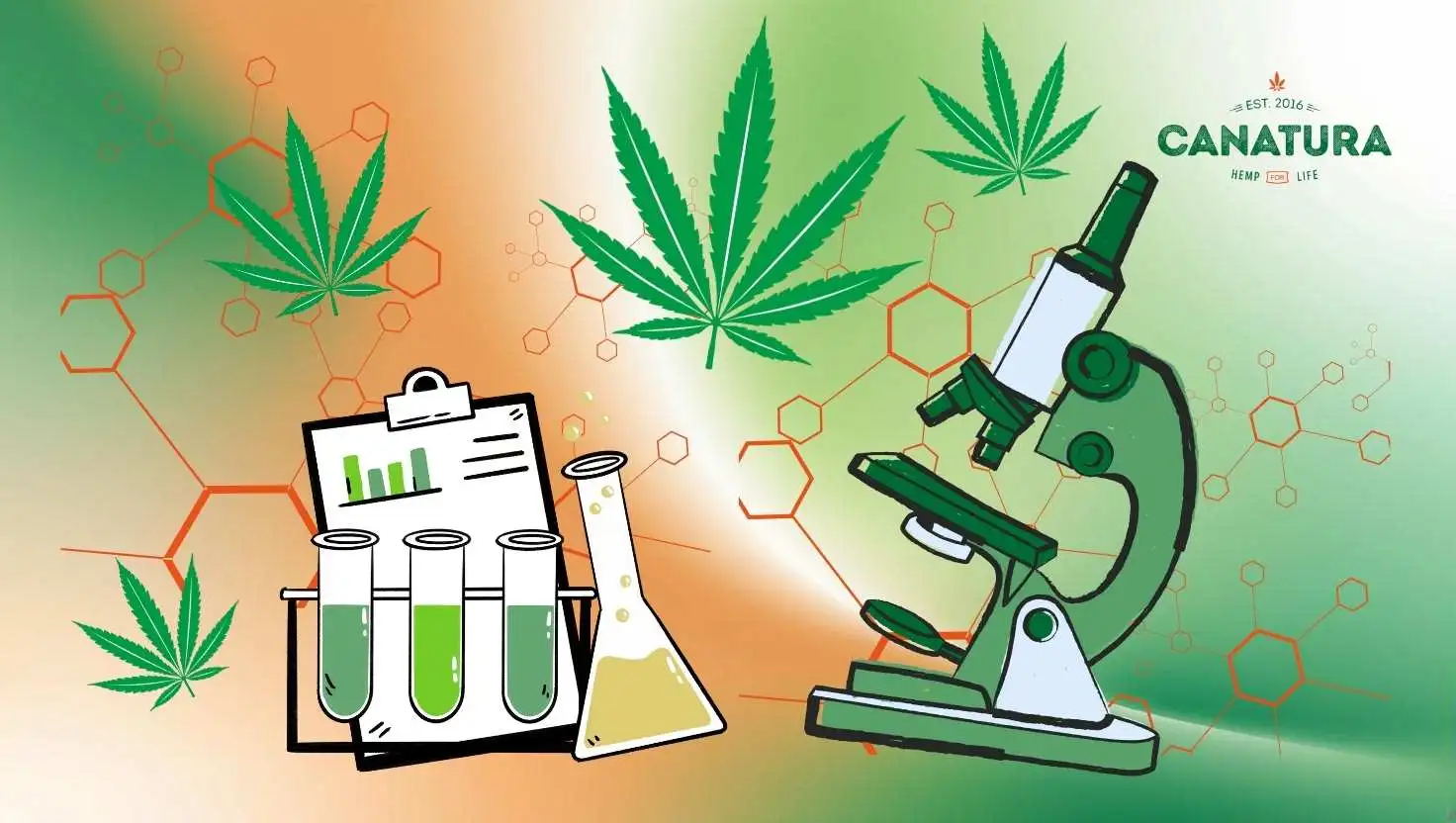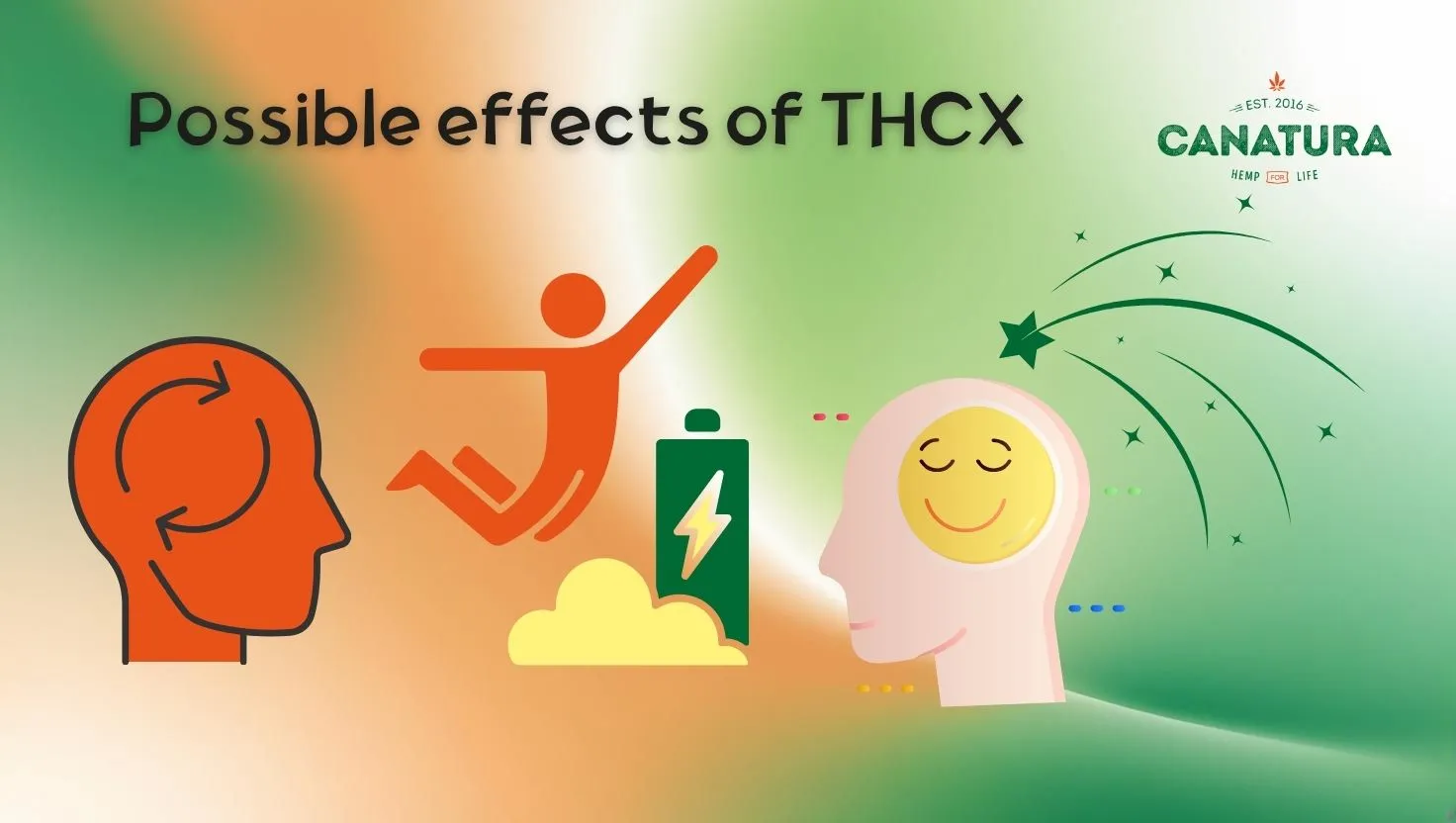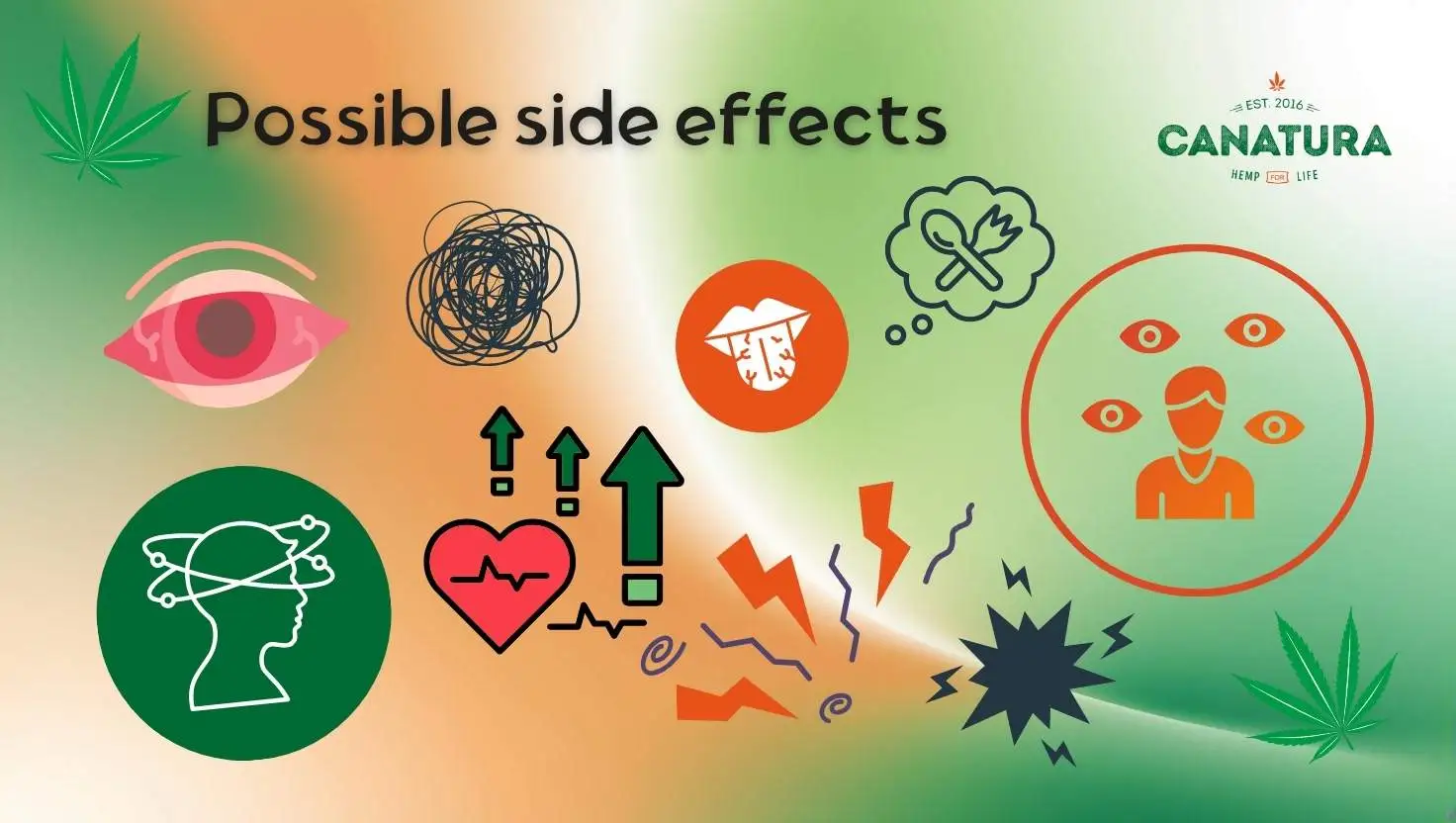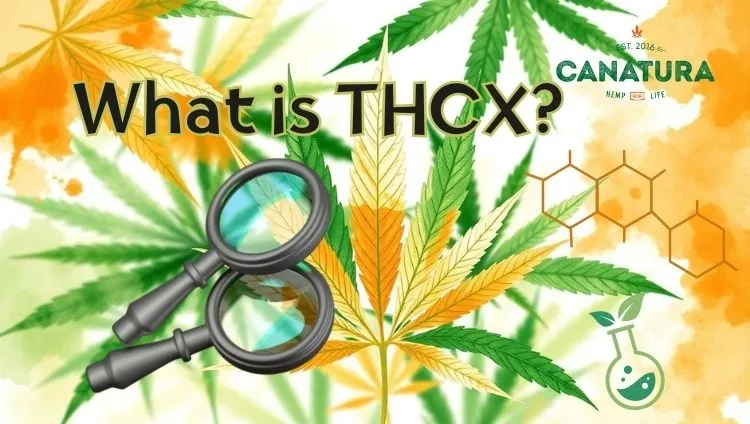THCX under the microscope: Production, effects, user experiences, and comparison with other cannabinoids
- What is THCX and where does it come from?
- What are the effects of THCX?
- Side effects
- Comparison with cannabinoids THC (delta-9), delta-8-THC, T9HC, and 10-OH-THC
- What THCX products are available on the market?
- Conclusion
- FAQ
What is THCX and where does it come from?
THCX (also known as THC-X or delta-X) is a relatively new (semi)synthetic derivative created by modifying known cannabinoids. This compound does not occur naturally in the cannabis plant; it is produced in a laboratory.
Some sources state that THCX is a mixture of three chemical esters of delta-8-THC, specifically acetoacetate, butyrate, and isovalerate, which are formed by attaching three organic (alkyl) groups to the delta-8-THC molecule.
THCX is therefore a designation for a mixture of delta-8 esters that are produced by a specific chemical process. Simply put, it is not a single specific molecule, but a mix of several related compounds derived from THC.
Delta-8-THC is found in the cannabis plant and has a similar structure to the better-known delta-9-THC (THC, tetrahydrocannabinol), but offers slightly weaker psychoactive effects. It is mostly produced synthetically from CBD (cannabidiol).

Commercial production of THCX
The basis for the production of THCX is usually CBD obtained from technical hemp, which is converted into delta-8-THC through a specific chemical reaction. Subsequent esterification (i.e., a chemical reaction with alcohols or acids) then produces so-called delta-8 esters, which are collectively referred to as THCX.
According to some available information, the American company Frozen Fields is behind the original formulation of THCX. It marketed the product under the name “Formula-X” and claimed that it was a unique, patented blend not commonly available on the market.
Manufacturers of these blends typically use legal cannabis with low delta-9-THC content, which meets legal limits and also serves as a base ingredient for further processing.
THCX labeling: A marketing gimmick?
The term THCX was soon adopted by other manufacturers, mostly as a marketing label rather than a description of a specific substance.
Some brands present THCX as their own “cannabinoid blend” without specifying the composition. There is also speculation that in some cases it may just be renamed delta-10-THC or a mixture of by-products that arise during the production of other cannabinoids.
At present, it appears that different sellers may be offering different substances under the name THCX.
What are the effects of THCX?
Based on the information that THCX is derived from the structure of delta-8-THC, it has psychoactive effects.
Users describe the effects of THCX as very similar to those of classic delta-9-THC, i.e.:
- changes in perception
- euphoria
- stimulation or increased energy
The onset of the effect is relatively fast, thanks to the allegedly better bioavailability of esters. The effect lasts for a relatively long time, but this will also depend on the specific product and combination with other cannabinoids.
Some users report that the “high” from THCX can be stronger than that of regular THC and that it can have more pronounced hallucinogenic effects. Some reports suggest that it is about three times more psychoactive than THC at the same dose.
On the other hand, there are also opinions that the potency of THCX is only about 50% of that of delta-9-THC, which would make its effects more similar to milder variants such as delta-8 or delta-10.
These differing reports on the effects and potency of THCX are likely related to several factors.
One of them is that there are not enough scientific studies, so we have to rely mainly on subjective user experiences. At the same time, however, it also plays a role that many manufacturers have started using the term THCX, but the chemical basis of the product they offer under this name may be different for each manufacturer.

Potential therapeutic benefits
According to some users and manufacturers, THCX may help with:
- pain and inflammation
- nausea
- anxiety and depression
- insomnia
However, these effects are mainly based on analogies with delta-8 and delta-9-THC, which have known therapeutic properties. However, there are no scientific studies on THCX – all knowledge is based solely on individual experience.
User experiences
On the Reddit discussion forum about a year ago, one experienced user said that they had vaped a vape containing THCX and that it wasn’t a bad “high” – they found the effect to be fine. However, they expressed concern that it might just be a renamed compound of delta-8-THC.
Another user shared an explicitly negative experience with THCX vape cartridges, saying that the first puff was “so irritating and caustic that he almost choked to death.”
Several people in the discussion agreed that the THCX label seems like a marketing ploy and that these products probably contain mostly delta-8 or another well-known substance, just repackaged under a new name.
The experienced community of alternative cannabinoid users is rather critical of THCX. Although they welcome innovation, they point to insufficient transparency regarding composition and efficacy.
Some individuals reported that products containing THCX subjectively helped them and that the effect was similar to that of regular THC.
However, reliable information is lacking and experiences may vary significantly from product to product.
Side effects
As with other potent psychoactive cannabinoids, side effects may also occur.
Common recognized physical symptoms similar to THC include:
- Dry mouth
- Irritated or red eyes
- Increased appetite
- Increased heart rate
Due to the potentially high potency of THCX, there is a risk of unpleasant psychological effects such as:
- Anxiety or paranoia
- Disorientation
- Panic attacks
- Dizziness
It cannot be ruled out that some sensitive individuals may experience short-term hallucinations or psychotic episodes.
Users on forums also report problems such as stomach upset or diarrhea, but these effects are likely to be related to the quality of specific products rather than THCX itself.
The intensity of the effects depends on the user’s health, metabolism, and sensitivity, as well as the dose and method of consumption.

Personal experience: THCX and unpleasant mental states
Although it is often repeated that adverse effects are particularly likely at high doses and in inexperienced users, my experience shows that this is not necessarily the case.
I work in the cannabis industry, I am used to testing various products, and I am not easily surprised. Nevertheless, THCX literally threw me off balance and I experienced something like a “bad trip“.
How did it start?
I bought THCX randomly in an unnamed store in Prague. I chose the flower form. Right at the beginning, however, I made a fundamental mistake – I didn’t check the exact composition and went for a 50% concentration of THCX. After three puffs, an unpleasant mental state set in almost immediately.
I should add that I was in a pleasant environment and the overall “set and setting” was fine.
What happened?
A wave of paranoia came over me – I felt like my soul had left my body. I couldn’t get up from the bench, I felt like I wasn’t myself – a typical experience of depersonalization. Added to this was the thought that I was having a heart attack (my heart rate was completely normal) and I felt very depressed. It was difficult, even though I am used to working with the effects of cannabis and I know that “the mind plays a big role”.
The intense part lasted about an hour.
What helped me?
- I kept repeating to myself that this state was temporary and would pass.
- I had mineral water with me, so I drank a lot.
- A chocolate bar helped – the sugar can slightly stabilize energy levels during stressful situations.
- I remained seated on the bench until I felt I could stand up again.
- Unfortunately, even after the effects wore off, I felt sad and mentally exhausted for another two days, so I went to yoga and exercise and tried to occupy my mind with other things.
What does this mean?
- Experience does not equal immunity. Even experienced users can experience challenging effects, especially with new and little-studied substances such as THCX.
- Don’t underestimate the content or form. The term THCX can refer to various substances and mixtures – manufacturers are not always transparent.
- Verify and ask questions. Find out the origin and composition before trying a product.
- Be prepared. Water, food, and a calm environment are essential.
- Trust your mind. Calming phrases such as “it will pass” are more powerful than you think at the moment.
- Treat yourself to some mindful self-care. If you feel sad or exhausted after a negative experience, don’t just sit there – get active to take your mind off things. Exercise, your favorite activities, or a walk in nature can be powerful allies in helping you feel better again.
Comparison with cannabinoids THC (delta-9), delta-8-THC, T9HC, and 10-OH-THC
The following table provides a clear comparison of THCX with cannabinoids – THC, delta-8-THC, T9HC, and 10-OH-THC, including their specifications, intensity of effects, and current legal status.
|
|
THCX |
THC (delta-9) |
delta-8-THC |
||
|
Specification |
Synthetic mixture of cannabinoids (e.g. delta-8-THC esters).
Different manufacturers may use different compositions. |
A compound naturally abundant in the cannabis plant. |
An isomer of THC found only in trace amounts in cannabis.
Commercially obtained by synthetic isomerisation of CBD or THC.
|
A substance produced exclusively in a laboratory, the manufacturing process of which remains a secret. |
A hydroxyl derivative of THC, formed by changing the original structure of THC through chemical processes.
|
|
Psychoactive effects |
✅ |
✅ |
✅ |
✅ |
✅ |
|
Intensity of effects |
Very strong.
Some manufacturers report a significantly more euphoric and longer-lasting “high” than with classic THC. |
Moderately strong psychoactive effects, well known and predictable. |
Milder psychoactive effects than delta-9.
Intoxication is noticeably weaker and less intense. |
Similar to the effects of HHC or THC. |
Low and much weaker than THC. |
|
Legal status |
Legal, but legal interpretation may vary from country to country. |
Maximum permitted amount in most EU countries is 0.3%, in the Czech Republic 1%. |
Probably illegal in countries that regulate synthetic THC derivatives. |
Legal, but legal interpretation may vary in individual countries. |
Legal, but legal interpretation may vary in individual countries. |
What THCX products are available on the market?
THCX is available on the market in a wide range of products, from vapes and cartridges to liquids and flowers enriched with extract, hash, concentrates, and edibles.
As mentioned above, the name THCX can refer to different substances depending on who manufactures the product. Some manufacturers use the designation THCX for their own cannabinoid blends, often without specifying the exact composition.
That is why independent laboratory tests are important, as they verify not only the content of active substances and any contaminants, but also what the product actually contains.
Conclusion
THCX is a substance that arouses curiosity, but also some concern. Although it may offer some users effects comparable to THC, there is a lack of scientific evidence, a uniform definition, and reliable regulation.
Given that different mixtures with varying potency and purity may be sold under the same name, it is crucial to ensure manufacturer transparency and require laboratory testing.
Dr. Goldstein, a renowned California physician with over 15 years of experience in medical cannabis, stated that “synthetic derivatives such as delta-8-THC and delta-10-THC often contain unidentified compounds and residual solvents, making them potentially dangerous products for human consumption.”
In contrast, natural cannabinoids such as CBD are considered safe and effective and have been the subject of research in recent years, for example in connection with neurological disorders, including epilepsy and autism in children.
Keep in mind that (semi)synthetic cannabinoids can be far more potent than natural ones. The risk of overdose or intoxication is therefore higher. Approach these compounds with caution and respect, and start with the lowest dose possible to enjoy them safely and peacefully 🙂.
FAQ
1. Who is THCX suitable for?
THCX is exclusively for experienced users, as user experience to date has shown that it has an intense psychoactive effect.
If you are new to the world of cannabis, it is better to stick to traditional cannabinoids such as CBD, CBN, CBG or THCV. If you are attracted to new compounds but do not have much experience, choose H4CBD, CBG9 or CBNO.
An interesting alternative may also be products THC+, which offer a mild entourage effect of THC and often contain other cannabinoids and natural ingredients for synergistic effects. The products contain less than 0.3% THC and have no psychoactive effect.
2. Is THCX safe?
There are many unknowns surrounding the safety of THCX. As it is an unregulated synthetic compound, there are no official quality standards or long-term toxicity studies.
The risk may come not only from the substance itself, but also from its purity. Residues of solvents or other undesirable by-products from the chemical reaction may remain in the extract.
For example, on the Reddit discussion forum, some users have described irritating effects from vape liquids containing THCX, which may indicate the presence of harsh chemicals or an insufficiently purified extract.
Independent laboratory testing is therefore essential to verify quality and safety. If the manufacturer does not publish these tests, be cautious. In some cases, it is best to avoid the product altogether.
Another commonly overlooked danger is the possibility of (easy) overdose – if THCX is indeed significantly stronger than regular THC, the user may not be able to gauge this and easily end up in an unpleasant mental state, known as a “bad trip“.
3. Is THCX legal?
The legal status of THCX varies depending on the specific country and jurisdiction. At present, it can be said that it falls into a gray area.
In the US, the situation is such that the 2018 Farm Bill legalized all cannabinoids derived from hemp with a THC content of less than 0.3%. Based on this, if THCX is produced from legal industrial hemp, it formally falls into this category.
There is currently no specific legislation for THCX in the EU. We always recommend checking the current legislation in your country.
4. Can I drive after taking THCX?
No! THCX has psychoactive effects that can affect coordination, perception, and reactions. Never drive or operate machinery after taking similar substances.
Under no circumstances should you combine it with alcohol or other psychoactive substances.
5. Will THCX show up in drug tests?
Without laboratory analysis, it is impossible to say with 100% certainty how a given product will affect the results of a drug test.
Dr. Salah Breidi, chief toxicologist and forensic expert at AttoLife in the UK, said that “common toxicology tests often do not detect synthetic compounds.”
On the other hand, some sources say that standard drug tests are unlikely to distinguish THCX from THC. When metabolized in the body, esters appear to break down into common THC metabolites such as THC-COOH, so users may test positive.
The test result depends on the specific composition of the THCX product – for example, if it contains traces of delta-9-THC, delta-8, or other active forms, the likelihood of a positive result increases.
Sources:
- zakonyprolidi.cz/cs/2025-147
- ers.usda.gov/topics/farm-bill/2018-farm-bill
- healthline.com/health/delta-8-vs-delta-9-vs-delta-10
- reddit.com/r/altcannabinoids/comments/1amptiy/thcx
- fundacion-canna.es/en/meet-experts-interview-bonni-goldstein
- eurjmedres.biomedcentral.com/articles/10.1186/s40001-023-01443-6
- cannareporter.eu/en/2024/06/11/US-pediatrician-Bonni-Goldstein-launches-petition-against-ban-on-natural-CBD-medicines-in-California
- goldsteinwellness.com/education/35/delta-8-thc-and-its-derivatives
Author: Patricie Mikolášová
Photo: AI
“All information provided on this website, as well as information provided through this website, is for educational purposes only. None of the information contained herein is intended to be a substitute for a medical diagnosis and should not be considered medical advice or recommended treatment. This website does not endorse, condones or advocate the licit or illicit use of narcotic drugs or psychotropic substances or the commission of any other illegal activity. For more information, please see our Disclaimer .”


